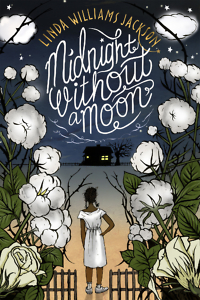“Why was everyone so afraid of blackness?” wonders thirteen-year-old Rose Lee Carter, the sagacious, spirited narrator of Midnight Without a Moon, a new middle-grade novel by Linda Williams Jackson. The opening scene sets the tone for the story: when Rose hears a pickup truck rattling up the road behind her, she dives for the grass. The driver is a local white boy with a “face tightened like a fist” who drives black children off the road and into the forest as a pastime. It is summer 1955 in the Mississippi Delta.
 Rose hasn’t had it easy. She never knew her father. When her mother married years ago, she left Rose and her brother with their grandparents, who are sharecroppers on a plantation. Rose spends her entire summer in the fields and in church, and now the one joy in her life, school, is likely to be snatched away so she can lend her hands to cotton picking and domestic work year-round. Meanwhile the people Rose loves most keep moving north and leaving her behind. Through her eyes, we see a world that is both bright with possibility and dark with doubt.
Rose hasn’t had it easy. She never knew her father. When her mother married years ago, she left Rose and her brother with their grandparents, who are sharecroppers on a plantation. Rose spends her entire summer in the fields and in church, and now the one joy in her life, school, is likely to be snatched away so she can lend her hands to cotton picking and domestic work year-round. Meanwhile the people Rose loves most keep moving north and leaving her behind. Through her eyes, we see a world that is both bright with possibility and dark with doubt.
As a narrator, Rose displays a rich inner world and sense of humor as she weighs the pros and cons of joining the Great Migration or staying home to demand what’s right for her people. Stunned by the injustice of black people being killed just for registering to vote, Rose struggles to understand why her community speaks of these murders only in hushed tones—or not at all. When Emmett Till is murdered one town over, Rose’s rebellious Aunt Belle comes down from Saint Louis. Now a card-carrying NAACP member, Belle epitomizes the education and mobility Rose craves, but also the danger of demanding civil rights.
Rose’s tyrannical grandmother makes for a wonderful antagonist. Ma Pearl warns her family about the NAACP: “Messing with them folks won’t do nothing but get a Negro kil’t.” She even blames Till for his own murder: “If that lil’ uppity Chicago boy hadn’t been up in that sto’ running his mouth, he would be with this mama ‘stead of in a grave.” Ma Pearl wants neither to fight Jim Crow nor flee it. She’s seen harder times and is protective of what little her family has. Despite her hardness, she’s a sympathetic antagonist because her tyranny is driven by hopelessness and fear: “This Miss’sippi. Ain’t nothing go’n never change.” For Ma Pearl, salvation waits beyond death, but Rose does not want to wait that long.
 It’s this inter-generational character building that makes the novel such a pleasure. Nonfiction accounts abound about the death of Till and the trial that acquitted the men who murdered him. It takes a rare writer like Jackson to locate the incendiary summer of 1955 not just in an historical context but in the hearts of characters with vastly different worldviews. The split between North and South is further conveyed in Jackson’s masterful dialogue. Where Rose’s Mississippi kinfolk speak in the melodious dialect of the Delta, Aunt Belle and her boyfriend Monty speak in crisp, clear sentences that appear plain among so much music.
It’s this inter-generational character building that makes the novel such a pleasure. Nonfiction accounts abound about the death of Till and the trial that acquitted the men who murdered him. It takes a rare writer like Jackson to locate the incendiary summer of 1955 not just in an historical context but in the hearts of characters with vastly different worldviews. The split between North and South is further conveyed in Jackson’s masterful dialogue. Where Rose’s Mississippi kinfolk speak in the melodious dialect of the Delta, Aunt Belle and her boyfriend Monty speak in crisp, clear sentences that appear plain among so much music.
The turmoil of Till’s death and the ensuing trial compound Rose’s inner struggle with her own blackness. Unlike everyone else in Rose’s “caramel-colored” family, she has a dark complexion: “Brown. Skinny. Like a bear who forgot to wake up from hibernation and starved through three winters.” To make matters worse, her best friend Hallelujah Jenkins is passionate about two things: civil rights and Rose’s much lighter-skinned cousin. What first appears as a preoccupation develops alongside the strife that turns the nation’s eyes on the Carter family’s county.
Williams lives just south of Memphis in Rosedale, Mississippi, and she embraces the nuances of the Delta and its people. Great storytelling is great storytelling, and the middle-grade label shouldn’t scare adults away from this fantastic book. Williams makes the historical content relatable to young readers while crafting a mesmerizing story about family, identity, and the South that deserves heaps of praise.

Erica Ciccarone is an independent writer living in Nashville. She holds an M.F.A. from the New School and contributes regularly to several print and online publications and to Nashville Public Radio. .





